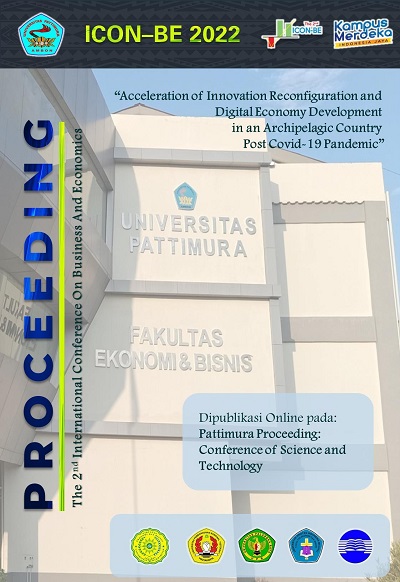WAGE IMPLEMENTATION SYSTEM IN SHARIA ECONOMIC PERSPECTIVE AS A SOLUTION TO INCREASE THE ECONOMIC LEVEL OF FLOATING CRAFT ENTREPRENEURS
Abstract
Introduction/Main objectives: This research aimed to find out the impact of fee-hiring practice on the incomes of floating netted-cage entrepreneurs, factors that interfered such practice, and the review of Sharia Economy on paying-hiring practice in fish farming by using floating netted-cage. Background problems: economic activity that has a wage system in it is the floating net cage business in Kampar Regency. Kampar Regency is the largest contributor to the production of freshwater aquaculture in Riau Province. This can increase the welfare of owners, entrepreneurs and managers of floating cages Novelty: studies on wages are generally studied on conventional concepts but in this study, it examines the concept of wages in the view of sharia economics Research methods: This field research applied qualitative descriptive method. The data were collected through interviewing 28 key informants and observing the fish cage directly in the site, which was in Kampar. Finding/Results: The practice of paying-hiring in fish farming by using floating netted-cage in Kampar did not involve written agreement. In addition, although the job descriptions were informed clearly, some entrepreneurs chose to not include the amount of payment information at the beginning. The payment was on time and the amount of payment was decided based on the payment standard of fish cage entrepreneurs. There was work accident compensation assurance, but there was not worker health assurance. The results also indicated that low payment standard that was decided by fish cage entrepreneurs became the main factor that caused failure of fee-hiring practice in raising floating netted-cage welfare in Kampar. Conclusion: Low standard payment was due to the assumption that given fee was sufficient for workers because of their consumption compensation. According to sharia sconomy the practice of fee-hiring was not based on the sharia economy principles, because it’s only encompassed justice principle, worthiness, and mutual assistance. However, the objective to bring welfare for workers was not achieved. Fish farming by using floating netted-cage became chance to get job especially for society in Kampar. In addition, this business had a good prospect. The escalation of entrepreneur’s economy was achieved. It was indicated by the number of fish cages that were owned by entrepreneurs in Kampar
Downloads
References
Imam, A.B. (2008). Ringkasan Shahih Bukhari, Jilid 3 (hadits 1676-2752). Alih bahasa M. Nashiruddin al-Abani. Terbitan Maktabah al-Ma'arif. Cetakan ke-1. Jakarta: Gema Insani.
Farihah, I. (2015). Filsafat Materialisme Karl Marx (Epistemology, Dialectical and Historical Materialism). FIKRAH: Jurnal Ilmu Aqidah dan Studi Keagamaan, 3(2), 431-454.
Lukman, H. (2012). Prinsip-prinsip Ekonomi Islam. Surakarta: Erlangga.
Karim, H. (2002). Fiqh Muamalah Edisi 1, Cetakan 1. Jakarta: PT. Raja Grafindo Persada.
Miles, B.M., & Huberman, M. (1992). Analisis Data Kualitatif. Buku Sumber Tentang Metode-Metode Baru. Jakarta: UI Press.
Mankiw, N.G. (2006). Pengantar Teori Ekonomi Makro. Edisi Ketiga. Jakarta: Salemba Empat.
Anwar, S. (2011). Metodologi Penelitian Bisnis. Jakarta: Salemba Empat.
Chaudhry, S.M. (2012). Sistem Ekonomi Islam: Prinsip Dasar (Fundamental of Islamic Economic System). Penerjemah: Suherman Rosyidi. Jakarta: Kencana Prenadamedia Group.
Sholihin, A.I. (2010). Buku Pintar Ekonomi Syari’ah. Jakarta: PT Gramedia Pustaka Utama.
Umar, C.M. (2001). Masa Depan Ilmu Ekonomi Sebuah Tinjauan Islam. Cetakan 1. Gema Insani Press, Jakarta.
Copyright (c) 2023 Pattimura Proceeding: Conference of Science and Technology

This work is licensed under a Creative Commons Attribution-NonCommercial-ShareAlike 4.0 International License.












